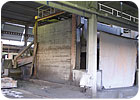
Granos S/A of Caucaia, Ceará, Brazil, near the city of Fortaleza, was founded 20 years ago by Francisco Silveira, whose background included work in the residential construction sector. In the course of his work, he became interested in the granite industry. The company began by supplying stone for commercial projects in Brazil, and it started exporting slabs to the U.S. in 2002. This included a range of exotic materials.
“We discovered that the exotics that were popular in Brazil were very popular in Italy and the U.S., and we had the technology to produce these materials,” explained Silveira, who pointed out that Granos was the first company to import a Breton slab polishing line from Italy.
Today, advances in technology such as resin products and machinery have allowed Granos to process a deeper range of materials than ever before. “Our point of view really changed after 2002, when we began exporting exotic slabs,” Silveira said. “In that way, it’s a new company. But even though technology led the way, the workers made it happen.”
Granos’ location in Ceará, where many of Brazil’s exotic stone materials are extracted, offers the company a competitive advantage, according to Silveira. In addition to owning several quarries in the region, they have developed solid relationships with other owners of other quarries, some of which are exclusive to Granos. “We have strong agreements with the local quarries,” he said. “When they open a new site, or a section of a quarry, the first block comes to us. From there, we decide what it will become.”
Some of the primary materials offered by Granos include Cavalavoro, Bordeaux, Red Dragon, Ocean Green, Olive Green, Juparana Green, Bianco Antico Green, Pantanal Green and Nacarado, among many others. Additionally, the company began processing a limestone variety, Crema Buzios, from a newly discovered quarry.
One priority for Granos is to always be searching for new materials. “You have to keep your eyes open and explore,” Silveira said, explaining that once a new potential material is discovered, the process then begins to gain the necessary permits and begin exploration. This can be a costly, time-consuming process, and the results are never guaranteed, so experience is key in deciding which materials to pursue.
In all, Granos has 250 employees, including 150 at the factory and offices and 100 at the quarries.

The factory
The stoneworking facilities at Granos process 30,000 square meters (nearly 325,000 square feet) of material per month. Blocks are processed using 12 gangsaws from BM of Italy. Before certain blocks are delivered to the gangsaws, they are encased in panels of scrap stone to help protect the integrity of the blocks.In addition to three automated Breton slab polishing lines, Granos added a key piece of technology for exotic stone production last year by investing in a bed polisher from Cimef. By using a bed polisher instead of automatic slab polishing lines, the operator can ensure that all areas of the slab are receiving adequate attention. This is particularly important for exotic materials, due to the amount of variation on the surface of the slabs.
Resin products are also applied to the products by hand as needed, and drying units from Rosh Industrial speeds the curing process.
In addition to maintaining quality equipment, Silveira explained that experience is a key factor in working with exotic materials. “It really is an art to make these slabs,” he said. “They are hard and costly to cut on the gangsaws, and difficult to polish.”

Increased sales efforts
Over the past year, Granos has made extensive efforts to expand its sales presence in the U.S. This has included the addition of two stone industry veterans to its commercial department -- Frank Ferreira and Gustavo Sarmento, both of whom travel to the U.S. on a regular basis. Silveira and the sales staff also regularly visit the quarry sites so they can pass along first-hand information to the company’s customers.In all, the company exports between 30 and 35 containers per month. The U.S. and Canada are primary markets for Granos, and the company is also looking to develop a client base in Europe.


